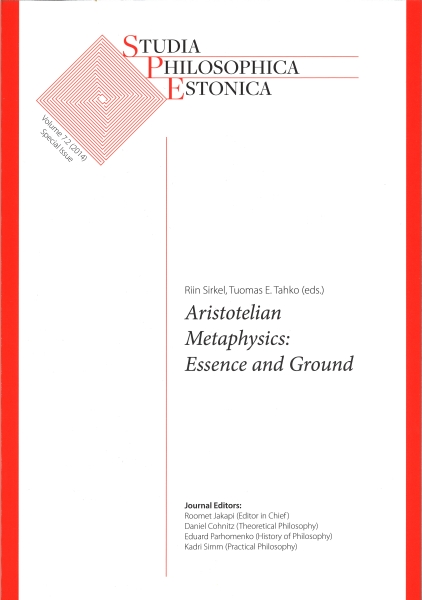Is Ground Said-in-Many-Ways?
DOI:
https://doi.org/10.12697/spe.2014.7.2.03Keywords:
Aristotle, ground, homonymyAbstract
Proponents of ground, which is used to indicate relations of ontological fundamentality, insist that ground is a unified phenomenon, but this thesis has recently been criticized. I will first review the proponents' claims for ground's unicity, as well as the criticisms that ground is too heterogeneous to do the philosophical work it is supposed to do. By drawing on Aristotle's notion of homonymy, I explore whether ground's metaphysical heterogeneity can be theoretically accommodated while at the same time preserving its proponents' desideratum that it be a unified phenomenon.
References
Ackrill, J. (1979). Categories and De Interpretatione (translated with notes), Clarendon Press, Oxford.
Anton, J. (1969). Ancient Interpretations of Aristotle’s Doctrine of Homonyma, Journal of the History of Philosophy 7/1: 1-18.
Ashworth, E. Jennifer, ‘Medieval Theories of Analogy’, The Stanford Encyclopedia of Philosophy (Winter 2013 Edition), Edward N. Zalta (ed.), URL = http://plato.stanford.edu/archives/win2013/entries/analogy-medieval.
Audi, P. (2012). Grounding: Toward a Theory of the In-Virtue-Of Relation, The Journal of Philosophy 109/12: 685-711.
Cameron, R. (2008). Turtles all the way down: Regress, Priority and Fundamentality, The Philosophical Quarterly 58/230: 1-14.
Cleary, J. (1988). Aristotle on the Many Senses of Priority, Southern Illinois University Press, Carbondale (IL).
Correia, F. and Schnieder, B. (2012). Grounding: an opinionated introduction, in F. Correia and B. Schnieder (eds), Metaphysical Grounding: Understanding the Structure of Reality, Cambridge University Press, Cambridge, pp. 1-36.
Daly, C. (2012). Scepticism about Grounding, in F. Correia and B. Schnieder (eds), Metaphysical Grounding: Understanding the Structure of Reality, Cambridge University Press, Cambridge, pp. 81-100.
Fine, K. (2001). The Question of RealismPhilosophers Imprint 1/2: 1-30.
Fine, K. (2012). The Pure Logic of Ground, The Review of Symbolic Logic 5/1:
Irwin, T. (1981). Homonymy in Aristotle, Review of Metaphysics 34: 523-544.
Jenkins, C.S. (2011). Is Metaphysical Dependence Irreflexive?, The Monist 94/2: 267-276.
Koslicki, K. (forthcoming 2015). The Coarse-Grainedness of Grounding, Oxford Studies in Metaphysics.
Matthews, P. (2007). The Concise Oxford Dictionary of Linguistics, Oxford University Press, Oxford.
Oderberg, D. (2007). Real Essentialism, Routledge, London.
Owen, G.E.L. (1960). Logic and Metaphysics in Some Earlier Works of Aristotle, in I. During and G.E.L. Owen (eds), Aristotle and Plato in the Mid-Fourth Century, Goteborg, pp. 163-90.
Owens, J. (1963). Doctrine of Being in the Aristotelian Metaphysics, Pontifical Institute of Mediaeval Studies, Toronto.
Pinchard, B. (1987) MÉtaphysique et sÉmantique. Autour de Cajetan. Étude et traduction du ‘De Nominum Analogia Vrin, Paris.
Raven, M. (2012). In Defence of Ground, Australasian Journal of Philosophy 90/4: 687-701.
Raven (forthcoming). ‘Ground Philosophers Imprint.
Rosen, G. (2010). Metaphysical Dependence: Grounding and Reduction, in B. Hale and A. Hoffman (eds), Modality: Metaphysics, Logic and Epistemology, Oxford University Press, Oxford, pp. 109-135.
Schaffer, J. (2009). On What Grounds What, in D. Chalmers, D. Manley and R. Wasserman (eds), Metametaphysics: New Essays on the Foundations of Ontology, Oxford University Press, Oxford, pp. 347-383.
Schaffer, J. (2012). Grounding, Transitivity, and Contrastivity, in F. Correia and B. Schnieder (eds), Metaphysical Grounding: Understanding the Structure of Reality, Cambridge University Press, Cambridge, pp. 122-138.
Schnieder, B. (2011). A Logic for ‘Because’, Review of Symbolic Logic 4: 445-65.
Shields, C. (1999). Order in Multiplicity: Homonymy in the Philosophy of Aristotle, Oxford University Press, Oxford.
Thomas Aquinas. (1949). Quaestiones Disputatae I: De Veritate, R. Spiazzi (ed.), Marietti, Rome.
Ward, J.K. (2008). Aristotle on homonymy: dialectic and science, Cambridge University Press, Cambridge.
Wilson, J. (2014). No Work for a Theory of Grounding, Inquiry: An Interdisciplinary Journal of Philosophy, http://dx.doi.org/10.1080/0020174X.2014.907542





